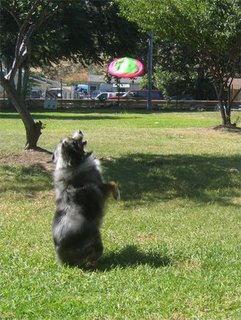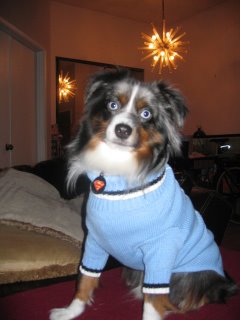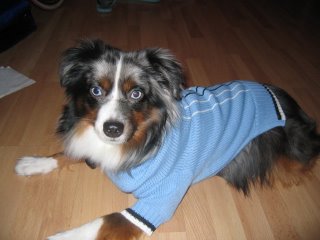Joel has called me a snob when it comes to my pets' food. And it's true. I go to little boutiques where they sell nothing but holistic and/or ultra-premium pet foods. I have driven 20 hours out of my way to buy pet food. Never mind there's a Petsmart not 3 miles away and a Petco not 5 miles away. I just mail-ordered for 11lbs of cat food because I can't find anywhere convenient around here to buy this new formulation.
I have to say that I used to feed my cats and my dog Science Diet because my vet said it was the best. For the first year of her life, Jezebel ate nothing but Science Diet and Purina and she is just fine. To this day, I am sure that you can feed Jezebel crap and she'd still be fine. Then I learned about the
Iams Cruelty case, and while I'm not against animal testing and I'm no great lover of PETA, I believe that what has been documented far exceeds what is necessary to make dog and cat food. But the Iams thing made me look closer at what I was feeding my cats, and I was appalled, simply appalled, to learn what major commercial brands put in pet foods. But really, it was Sambora that started the whole conversion to human-grade, holistic, ultra-premium, sometimes organic food.
Sambora is, to put it kindly, big-boned. And he loves to eat crunchy dry food. When Sambora hit 16 lbs., the vet told us to put him on a diet. So I switched him to Science Diet Light. No problem, right? Except he started eating Jezebel's food, and Jezebel, as a result, started eating his. So I put him on another diet food, which solved the problem of Sambora eating Jezebel's food, but he started getting diarrhea a lot. Reading up on it, I learned that cats shouldn't have too much fiber or carbohydrates, because it messes with their systems. I also learned that cats were
obligate carnivores and that carbohydrates weren't good for kitties. They, unlike dogs and humans, were not made to digest carbohydrates.
So cats are pure carnivores, but most store brands have grains as the first few ingredients. Why? I believe that commercially made dry cat food was made as an offshoot of dry dog food, and that dog formulations are only changed somewhat to meet the nutritional minimums of cats. So in today's market, you will find a lot of dry kibble labeled "for cats" when it is not actually designed for a cat's needs. And I'm just a little bit pissed that there are a lot of high-performance, high-protein dry foods for dogs, but to date, I have only found two over 40% protein for cats: Innova Evo for Cats and Nature's Variety Raw Instinct Grain Free for Cats. Dogs, unlike cats, are omnivores and they don't actually need high-protein diets like cats do.
Let's face it. If a cat cannot properly digest complex carbohydrates or plant-derived proteins, it's useless to feed these things to the cat. Nothing good can come of it.
The vet had recommended a wet food, Atkins like diet for Sambora, which would have been great for both cats except that Sambora doesn't really care for wet food. It's also very convenient to also just scoop out some dry food for the cats every morning. Innova Evo for Cats, made by
Natura Pets, works well for us, although the cats will try the Nature's Variety once we get it in the mail. They're both 50% protein and as close to what a cat needs in commercial dry kibble as possible. The cats are supplemented with grain-free wet food (currently that includes Merrick's Turducken formulation, Innova Evo for Cats, and various Wellness flavors).
And since it's easy for me since I'm already going hunting around for food for the cats, Romeo gets ultra-premium, holistic, sometimes organic, human-grade food as well. With him, I'm not so concerned that he gets a high-protein diet, since, again, dogs are omnivores and it's not as important that they get a high-protein meal, although right now he's regularly fed a high-protein dry kibble (Innova Evo and Innova Evo RM) at supplemented with a whole lot of fruits and other things. He also has a bunch of Lotus dry kibble (not high protein), which he adores as well. It's mainly important to me that Romeo's food is made of high-quality ingredients that are good for him and that he like eating the food. So that means no by-products, no corn, no "animal digest," whatever that is, no white rice or "brewer's rice." One can find a complete list online. Or I'll find one later to post.
So now, when going to a pet supply store, I take forever looking at different foods, the ingredient list, and their nutritional breakdowns. Because while I'm too lazy to cook my animals food on a regular basis, I can at least be a smart enough shopper. I don't feed my pets raw for the same reason I don't eat things raw at home - human handling = germs. While other people do and I applaud their efforts to keep their pets healthy and I'm sure they keep their animals' raw feed and feeding environment as sterile as possible, I don't buy that cats and dogs are able to handle salmonella better than humans. In fact, I believe that feeding cats and dogs only one or two things their whole lives weakens their internal digestive systems and weakens their immune systems in general (hence the whole having to switch food over a long period of time).
There is some correlation between lower grades of pet food and internal problems with pets, including tumors and digestive issues. Again, I believe that if I were to continue to feed my pets food that they could not process appropriately, nothing good could come of it. Moreover, since there is less "filler" in the more expensive foods, they are more nutritious bite for bite, and at the end of the day, it doesn't really cost more to buy the higher premium foods because they eat less of it. This has a secondary effect of having less for me to clean up after they poop. And only good things can come of that.
--
Posted By Tina to
Pet Care Articles at 8/17/2006 03:14:00 PM
Labels: Pet Health










